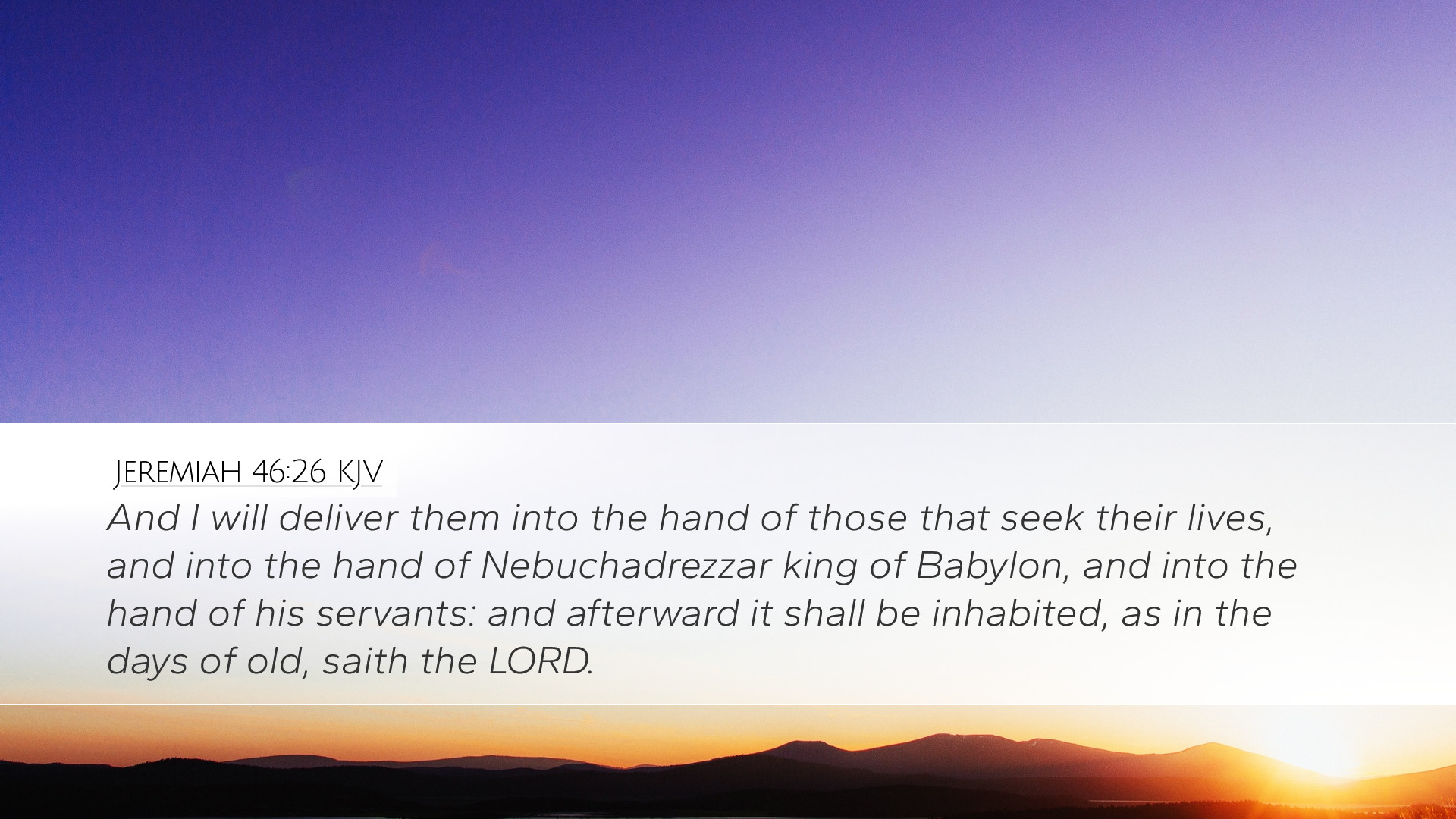Commentary on Jeremiah 46:26
Verse Text: "And I will deliver them into the hand of those that seek their lives, even into the hand of Nebuchadrezzar king of Babylon, and into the hand of his servants: and afterwards it shall be inhabited, as in the days of old, saith the Lord."
Introduction
The 46th chapter of Jeremiah contains prophecies concerning the nations surrounding Israel, with a particular focus on Egypt. This verse serves as a culmination of God’s sovereign plan concerning Egypt's fate and the overarching control of Babylon as a tool of divine judgment. The insights from various public domain commentaries help illuminate the depth and implications of this verse for pastors, students, theologians, and Bible scholars.
Theological Context
Jeremiah's prophecies often reflect God’s judgment and the ultimate restoration He has planned for His people. In this verse, we find a stark warning to Egypt, emphasizing their impending doom at the hands of Babylon—a recurring motif in the prophetic literature that signifies God’s use of foreign powers to execute His judgment.
Insights from Commentaries
Matthew Henry's Commentary
Matthew Henry emphasizes the certainty of God’s judgment as He delivers Egypt into the hands of Nebuchadnezzar. He asserts that this serves as a demonstration of God’s power over nations, portraying Babylon not merely as a conqueror but as an instrument of divine will. Henry highlights the phrase "those that seek their lives," which indicates that the Egyptians will be completely at the mercy of their conquerors, reinforcing the notion of divine retribution for idolatry and disobedience to God.
Albert Barnes' Notes on the Bible
Albert Barnes underscores the significance of God's declaration regarding Babylon's role: it is not merely a military power but a divine agent executing God’s judgment. Barnes points out that the reference to the servants of Nebuchadnezzar reflects a broader reality—those who would operate under his command, indicating total subjection. Furthermore, the promise of restoration "as in the days of old" points to a future hope beyond judgment, suggesting that even after devastation, God remains faithful to His covenant people.
Adam Clarke's Commentary
Adam Clarke offers a linguistic analysis of the terms "deliver" and "seek their lives," connecting them to the broader theme of deliverance and divine protection for the faithful. Clarke interprets God’s intent to use Nebuchadnezzar as a channel of correction, warning that nations ignoring divine warnings will face dire consequences. He also reflects on the final promise of restoration, which provides a theological anchor, reminding us that judgment is not the end of God’s plan but rather a precursor to reconciliation and revival.
Historical and Cultural Context
The historical backdrop of this verse includes the Babylonian conquest of Egypt, which marked a significant shift in regional power dynamics during the ancient Near East. Egypt, once a dominant power, becomes a victim of the very harsh realities they had imposed on others. The dual purpose of this prophecy serves both as a warning and as a testament to God’s sovereignty over historical events.
The Nature of Divine Judgment
In this text, the nature of divine judgment is executed with both justice and mercy. While God condemns Egypt due to its persistent idolatry and rebellion, there’s an assurance that this judgment is part of a redemptive arc for the people of God. Henry, Barnes, and Clarke collectively highlight that divine discipline often precedes deliverance, reminding readers that even in judgment, God’s ultimate aim is restoration.
The Finality of God's Word
God’s declaration through Jeremiah emphasizes the irrevocable nature of His word. The phrase "saith the Lord" acts as a seal of divine authority, indicating that what is asserted will surely come to pass. This calls for a level of reverence among scholars and theologians regarding the prophetic texts and their implications for understanding God’s dealings with nations.
Applications for Today
For pastors, students, and theologians, this verse raises powerful applications about the character of God, the seriousness of sin, and the hope found in divine promises. It is a reminder that God is sovereign over all nations, and even in judgment, there lies the potential for restoration. Understanding the weight of God's pronouncements invites a serious reflection on contemporary issues of governance, morality, and the role of the church in proclaiming truth in a world that often mirrors the disobedience of ancient Israel and Egypt.
Conclusion
Jeremiah 46:26 stands as a poignant illustration of God’s sovereign governance over world events, serving both as an indictment against idolatry and a promise of future restoration. Commentaries by Matthew Henry, Albert Barnes, and Adam Clarke collectively deepen our understanding of this text, inviting us to apply its truths in our own context while reminding us of the hope contained within God’s judgment—a hope not only for Israel but for all who seek His face.


